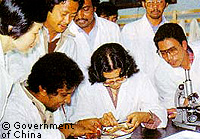European pharmaceutical firms are increasingly outsourcing R&D, says report
In an effort to alleviate the pressure imposed by lengthy drug discovery times and the soaring costs of development, European pharmaceutical and biotechnology companies are increasingly looking to outsource their research and development (R&D). A recent report by Frost & Sullivan, a global growth consulting company, highlights the outsourcing trend caused by the financial strain of drug development, currently estimated at approximately 680 million euro per product. This is compounded by the fact that only 15 per cent of new drugs entering development ultimately reach the market. The report predicts that the value of R&D outsourced by European drug companies will expand from 2.7 billion euro in 2004 to 4.3 billion euro by 2011. By selecting outsourcing partners from lower-wage countries, such as India and China, firms will be able to reduce costs. According to Dr Amarpreet Dhiman, Research Analyst at Frost & Sullivan: 'Outsourcing may be one strategy to adopt, which allows companies to control and utilise their R&D expenditure more effectively. 'Outsourcing can complement the in-house level of expertise and experience, giving access to technological innovations, [...] therapeutic expertise, and bringing about an alignment with diagnostic testing for safer and more effective therapies,' continued Dr Dhiman. 'This represents an important driver in addition to improvements in efficiency, cost and speed by removing conventional habits and processes.' Pharmaceutical companies are therefore forming alliances with biotechnology firms, university research centres, contract research organisations, specialised vendors and general service providers, which are increasingly extending their activities to serve the sector's unmet needs. These outsourcing partners will need to present a sound track record and be able to meet varied scientific and operational requirements. But the report also identifies a reluctance by some companies to lose overall control of their business processes and proprietary knowledge. As Dr Dhiman explains: 'Companies must become more comfortable about sharing some control over non-core processes, with the risk of errors and delays, with their ability to safeguard proprietary knowledge, and with the impact of outsourcing on regulatory compliance. It is important that the various risks are identified, understood and measured, so that companies can successfully pool their disciplines to their development partners.' The study predicts that by 2010, more than 40 per cent of R&D will be outsourced to more specialised firms. Those firms that succeed in effectively outsourcing their R&D to focused, research-orientated specialists that complement their traditional processes will emerge as leaders of the sector, it concludes.



